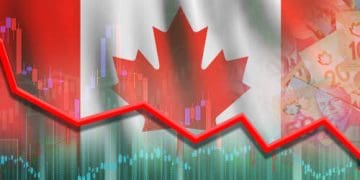Supply Chain Report – 10/08/2025
U.S. President Donald Trump said Tuesday that he is actively working on a trade deal with Canadian Prime Minister Mark Carney, expressing optimism that it would be well-received by Canadians. Speaking to reporters before their bilateral meeting in the Oval Office, Trump said, “The people of Canada will love us again,” signaling a positive tone for the ongoing discussions.
Trump and Carney met with senior officials from both countries for an in-depth face-to-face discussion and luncheon at the White House, aimed at addressing ongoing trade issues that have affected critical sectors, including steel, aluminum, automotive manufacturing, and forestry. These sectors have experienced significant disruption, with job losses in manufacturing and declining exports impacting both economies.
When asked whether Canada would secure concessions or leave the meeting without progress, Trump responded, “I think they’re going to walk away very happy,” adding that the United States intends to treat Canada fairly in trade matters. However, by late afternoon, no formal agreement had been finalized, indicating that further negotiation is necessary.
Canada-U.S. Trade Minister Dominic LeBlanc briefed reporters in Carney’s stead, describing the discussions as “successful, positive, substantive” and noting that substantial progress had been made, though he did not provide specifics about the unresolved issues. LeBlanc emphasized that both sides had instructed officials to “continue the conversation and to quickly land deals that will bring greater certainty,” expressing optimism that a mutually beneficial agreement can be reached.
Further negotiations are expected to continue even after the departure of Carney and the main Canadian delegation, with LeBlanc remaining in Washington to advance discussions. Key topics include the steel, aluminum, and energy sectors, as well as broader trade arrangements designed to serve the economic and security interests of both countries. Carney was also scheduled to meet with U.S. Vice President JD Vance for a working dinner focused on resolving the remaining trade impasse.
Trump emphasized the competitive nature of the U.S.-Canada economic relationship, calling it a “natural conflict,” and noted that the United States aims to prioritize domestic production in sectors like automotive manufacturing and steel. He also highlighted ongoing discussions regarding potential quotas on Canadian products, suggesting that such measures could be considered as part of a broader trade agreement. U.S. Ambassador to Canada Pete Hoekstra had previously referenced a similar quota arrangement in the agreement with the U.K., which allowed for reduced tariffs on a limited number of imported vehicles.
While Trump confirmed that tariffs would remain in place, he signaled openness to renegotiating the Canada-U.S.-Mexico Agreement (CUSMA) next year, a move welcomed by Canadian officials who seek to preserve free-trade access for most Canadian products. Carney acknowledged areas of economic competition but stressed the importance of reaching a fair and balanced agreement on tariffs that benefits both sides.
Throughout the public portion of their meeting, both leaders expressed mutual respect. Trump complimented Carney as a “very strong” and “world-class leader,” while Carney described the U.S. president as a “transformative leader” who has facilitated major economic agreements. Trump also recognized Canadian efforts to strengthen border management and enforce trade regulations, highlighting the importance of cooperation in addressing shared challenges.
Canada’s economy has been affected by U.S. tariffs, with notable impacts on Ontario’s manufacturing sector, aluminum exports, and forestry. These measures have also created knock-on effects in the U.S., increasing costs for American businesses and consumers and contributing to inflationary pressures. According to the Tax Foundation, the tariffs represent one of the largest increases in trade-related taxes in recent decades.
Political leaders in Canada have expressed growing impatience over the ongoing negotiations. Ontario Premier Doug Ford said Tuesday that if a deal cannot be reached soon, retaliatory measures may be necessary. “Sit down, let’s get a deal, or let’s start hitting back,” Ford said. Conservative Leader Pierre Poilievre echoed concerns about the lack of tangible results, noting that Canada has yet to achieve a clear victory in discussions with the United States.
The White House has highlighted ongoing foreign investment in the U.S., including commitments from Canadian companies to invest tens of billions of dollars, contingent on reaching a satisfactory trade agreement. Both countries continue to work toward a resolution that balances economic priorities and ensures stability for industries and consumers on both sides of the border.
Trade negotiations between Canada and the United States remain active, with officials continuing to explore avenues for agreement while managing the economic effects of ongoing tariffs. The discussions are expected to remain a focal point of bilateral relations in the coming months.
#TradeNews #CanadaUSRelations #TariffUpdate #EconomicPolicy #InternationalTrade















